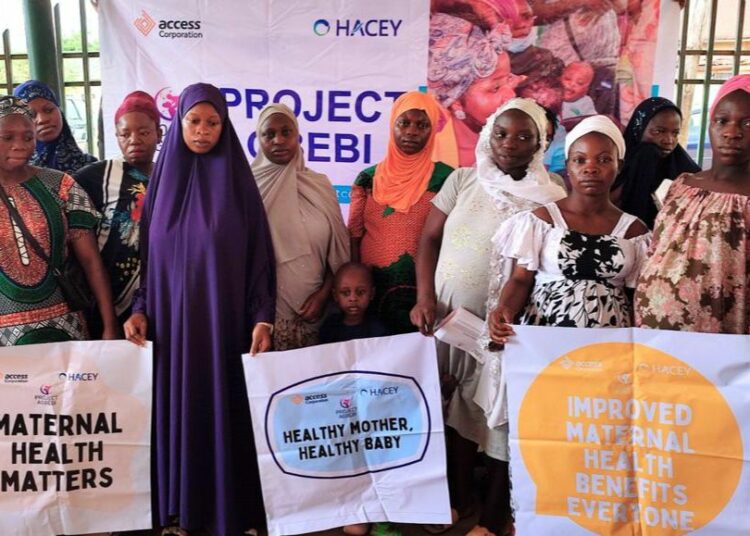As part of efforts to reduce the high rate of maternal mortality which is put at 512 deaths per 1,000 live births in Nigeria, a non-governmental organisation, Hacey, and Access Corporation, have held a workshop to sensitise pregnant women on the dangers of the incidence.
Speaking at the workshop with the theme, ‘Project Agbebi, improving maternal health outcomes’, at the Aba South Health Authority office, Aba, Abia State, the Programme officer, Hacey, Bamidele Oyewumi, stated that maternal mortality refers to the death of a woman while pregnant, during delivery, or within 42 days after deliveryl excluding deaths caused by accidents or violence.
He disclosed that ‘Project Agbebi’ aims to reduce maternal mortality rate by 15%, stressing that the project has reached over 30,000 pregnant women in 200 primary health care centres (PHCs) in 42 local government areas across 18 states in Nigeria.
Oyewumi explained that the neo-natal mortality rate in Nigeria is 39 deaths per 1,000 live births, which means that nearly four out of every 100 newborn babies in Nigeria do not survive their first month of life.
The program officer further disclosed that the maternal mortality and neo-natal mortality rates are the crucial health indicators that reflect the overall quality of a country’s healthcare system and the well-being of its women.
He said; “The project has a primary goal of reducing maternal mortality by improving access to safe and essential birthing kits, empowering women to make informed health and financial decisions, and fostering communal support for pregnant women.
“In Nigeria, the maternal mortality rate remains alarmingly high, with a significant gap in achieving the global target of reducing maternal mortality ratio to less than 70 per 100,000 live births. According to the Nigerian Demographic and Health Survey (NDHS) of 2018, the maternal mortality ratio, MMR, in Nigeria is 512 deaths per 100,000 live births, which is one of the highest rates in the world.
“In addition, the neo-natal mortality rate is 39 deaths per 1,000 live births, meaning that nearly 4 out of every 100 newborn babies in Nigeria do not survive their first month of life. This is not surprising as the death of the mother and the mother’s lack of access to health care can also have a devastating impact on the health and survival of her newborn baby.”
He also attributed the high rates of maternal and neonatal deaths in Nigeria to three factors; delay in deciding to seek maternal healthcare, delay in locating and arriving at a medical facility, and delay in receiving skilled pregnancy care upon arrival at the health facility, especially at the rural areas.
“When a woman does decide to seek care, she may encounter challenges in locating a suitable healthcare facility, particularly in rural areas where access to healthcare is often limited. Even if a facility is located, delays in receiving skilled pregnancy care can occur due to shortages of trained health workers, inadequate equipment and supplies, and poor quality of care.
“HACEY has developed “Project Agbebi” as a response to some of the maternal health delays in order to improve maternal health outcomes in Nigeria.
“Project Agbebi addresses critical gaps in maternal healthcare delivery in Nigeria, aiming to significantly reduce the high maternal mortality rate and improve maternal health outcomes. The project targets the root causes of maternal death and implementing a multifaceted approach, including community-based support groups, health and financial literacy training, provision of birthing kits, and media awareness campaigns.”
Speaking at the workshop, Health Authority Secretary,Aba South Council area, Mrs Glory Nnennaya Okwara, sensitized the pregnant women and nursing mothers on how to take care of themselves and their babies.
She also taught on the type of food to take and charged nursing mothers to embark on exclusive breast feeding of their babies for six months before introducing alternative foods.
“We have sensitized them on prenatal,antenatal and what they need to do to take care of themselves and their babies, especially about food nutrients. Giving their babies breast milk from 0 to 6 months. Most of them said they have learnt about how to take care of their babies and how to avoid disease conditions which they were not previously aware of.”
A pregnant lady, Brenda Onyeibe, commended HACEY and Access Corporation for the workshop, which she said has enlightened them on how to care for themselves and their babies.










